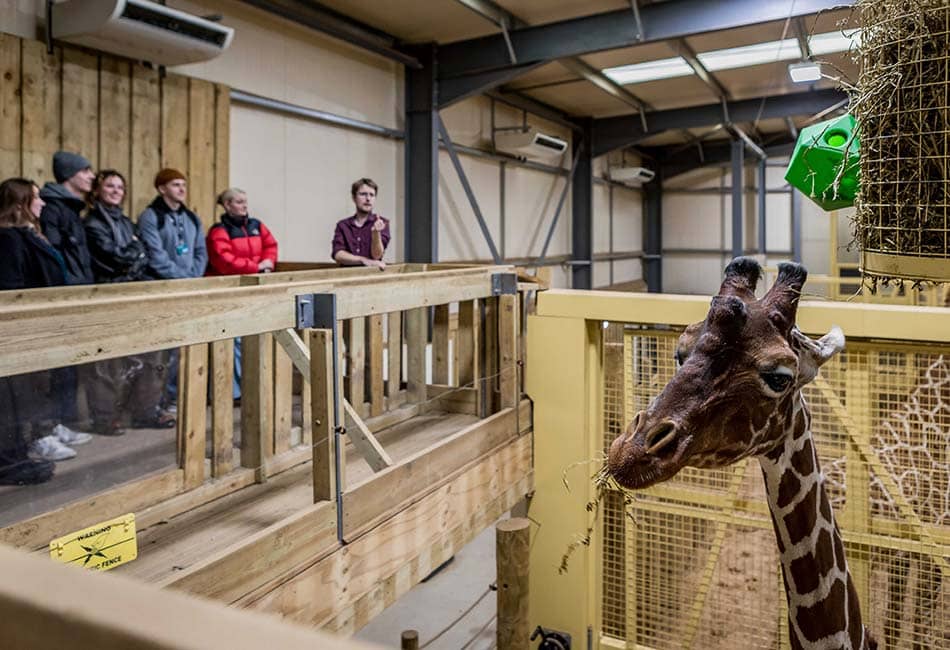
FdSc Integrated Wildlife Conservation
This course is open for applications
About
We're the only university to offer a FdSc Integrated Wildlife Conservation foundation degree in partnership with a working zoo, learning from conservation scientists with real-world experience.
Why study integrated wildlife conservation?
By taking a biological approach to studying wildlife conservation, we can get a deeper understanding of our relationship with wildlife and the impact of our actions on it.
Studying conservation at this level gives you a springboard into further study, and a variety of interesting conservation careers.
Why UWE Bristol?
FdSc Integrated Wildlife Conservation is particularly relevant if you're attracted to a career in conservation and want to gain the practical experience so valued by employers alongside the theory.
You'll attain a recognised qualification in wildlife conservation after two years and can take your study to degree level by doing the one-year BSc(Hons) Integrated Wildlife Conservation top-up at UWE Bristol.
Gain the practical skills and knowledge to work in wildlife conservation and play a positive role in helping to solve conservation challenges.
You'll be well placed in Bristol, which is home to the BBC's world-renowned Natural History Unit, and a recognised hub for environmental organisations and projects.
You'll gain invaluable learning experience with Bristol Zoo and where possible, participate in diverse conservation projects and fieldwork both in the UK and overseas.
This course is run by highly experienced conservation experts at Bristol Zoological Society and UWE Bristol, who are leading national and international conservation projects. They'll bring their experiences working on innovative projects into the classroom, and this will enhance your employment opportunities by bringing you closer to the project leads.
Bristol Zoological Society is set to expand as they continue moving to their new Bristol Zoo Project location over the coming years. They have exciting plans to establish a Conservation Learning Centre, which will be a purpose-built hub for their higher education provision. This puts UWE Bristol in the unique position as co-creators of this state-of-the-art facility, providing exciting new opportunities for you as a wildlife conservation student.
It's an exciting time to join this course, as you'll study at the Conservation Education Centre at Bristol Zoo Gardens where Bristol Zoological Society's world-renowned Field Conservation and Science Department is based, as well as at the Bristol Zoo Project for the first time.
Discover more about Bristol Zoological Society's future plans.
Where can it take me?
This course is excellent preparation for local, national and international careers in conservation.
Around 90 percent of our graduates continue to do their full BSc(Hons) degree in Integrated Wildlife Conservation. This allows you to study a range of contemporary topics in depth, including Primate Conservation, Wildlife Film and Media, and Science Communication, while developing your research skills through your research project.
We encourage you to apply for volunteering roles in the holidays, to add extra weight to your CV.
Watch: Study with Bristol Zoological Society
Please note, that the Wild Place Project referred to in this film is now called Bristol Zoo Project.Entry
Typical offers
You will need to meet the following Level 2 requirements:
- GCSE: Grade C/4 or above in English, Mathematics and Double Science, or equivalent.
In addition to the above Level 2 qualifications, you'll need to achieve the published tariff points from your Level 3 studies prior to entry. Below is an indicative list of the main qualification types. However, we will consider any Level 3 qualifications towards meeting our entry requirements.
- Tariff points: 64
- Contextual tariff: See our contextual offers page.
- English Language Requirement:
International and EU applicants are required to have a minimum overall IELTS (Academic) score of 6.0 with 5.5 in each component (or approved equivalent*).
*The university accepts a large number of UK and International Qualifications in place of IELTS. You can find details of acceptable tests and the required grades you will need in our English Language section. Please visit our English language requirements page.
- A-level subjects: A minimum of an AS in a Science subject.
- Relevant subjects: Subjects that meet the Science requirement for this course: Applied Science, Biology, Human Biology, Chemistry, Design Technology, Environmental Science/Studies, Geography, Geology, Maths, Use of Maths, Physical Education, Physics, Psychology, Science in the Environment, Statistics.
- EDEXCEL (BTEC) Diploma: You will need a minimum of three units in a Science subject. You may be asked to do more based on the size of your units. Please list the units you are studying in your application. For further advice on acceptable units, please email admissions (contact details below).
For information on required Guided Learning Hours please see our minimum entry requirements page.
- Access: Level 3 credits in Science.
- Baccalaureate IB: To include Science at Higher Level. We accept the IB Career-related Programme in conjunction with other Level 3 qualifications.
- Irish Highers: A minimum of O4 in a Science subject.
- Welsh Baccalaureate: We accept tariff points achieved from the Advanced Skills Baccalaureate Wales in conjunction with other Level 3 qualifications. This qualification cannot be used to satisfy any subject specific entry requirements.
- Cambridge Technical: You will need a minimum of three units in a Science subject. You may be asked to do more based on the size of your units. Please list the units you are studying in your application. For further advice on acceptable units, please email admissions (contact details below).
For information on required Guided Learning Hours please see our minimum entry requirements page.
- T Levels: Science or Healthcare Science. If you partially achieve your T Level, you can meet our subject requirements if you have at least a C in your Core Section. For further advice on acceptable subjects please email admissions (contact details below).
Entry requirements
Read more about entry requirements.
How to apply
Read more about undergraduate applications.
For further information
- Email:
UK applicants
Admissions@uwe.ac.ukInternational/EU applicants
International@uwe.ac.uk - Telephone:
UK applicants
+44 (0)117 32 83333International/EU applicants
+44 (0)117 32 86644
Structure
Content
Year one
You'll study:
- Ecology and Environmental Systems
- Wildlife Biology
- Wildlife and People
- Professional Work Skills.
Year two
You'll study:
- Conservation Biology
- Animal Behaviour for Wildlife Conservation
- Effective Communication for Conservation
- Integrating Sustainable Development and Conservation
- Work and Research Skills.
This structure is for full-time students only. Part-time students study the same modules but the delivery pattern will be different.
The University continually enhances our offer by responding to feedback from our students and other stakeholders, ensuring the curriculum is kept up to date and our graduates are equipped with the knowledge and skills they need for the real world. This may result in changes to the course. If changes to your course are approved, we'll inform you.
Learning and Teaching
You'll study with Bristol Zoo in the dedicated Institute of Conservation Science and Learning, and be taught by experts from the zoo and University, learning about live conservation projects.
This is a hands-on course, so you'll take part in conservation projects and fieldwork, and work with different conservation organisations in the UK and overseas (where possible).
See our full glossary of learning and teaching terms.
Assessment
We use a range of assessment tools to reflect the different concepts, knowledge and skills we develop on the course. You can expect to be assessed using coursework and exams in both years.
Fees
Full time course
Indicative Additional Costs
Supplementary fee information
Students who are ordinarily resident in Wales are not currently able to apply for statutory student funding support from the Welsh Government, via Student Finance Wales, for this course if they are joining it for the first time on or after the 1st of January 2026.
Learn more about fees and funding.
Additional costs
This refers to items you could need during your studies that aren't covered by the standard tuition fee. These could be materials, textbooks, travel, clothing, software or printing.
Features
Placements
Students who go on work experience tend to graduate with better degrees. Experience also hones your skills, industry knowledge and professional network, making you a sought after graduate.
You'll go on 100 hours of placements in each year of this course, supported by a range of conservation organisations.
Previous students have worked with Bristol Zoo, Oak and Furrows Wildlife Rescue Centre, Tree Life Centre, British Trust for Conservation Volunteers, Somerset Wildlife Trust, and Wildfowl and Wetlands Trust.
We'll encourage you to take up volunteering roles to boost your experience further.
Get help to find a placement and support throughout from college staff and our award-winning careers service.
Fieldwork
Take part in real-world conservation projects and apply your academic knowledge to practical situations in the field.
Go on residential field trips in both years.
If you progress to level three of the BSc(Hons) Integrated Wildlife Conservation course, you can choose to go on a self-funded two-week field trip to the Madagascan rainforest or to Cuba.
Study facilities
Bristol Zoological Society offers exceptional learning facilities, including a dedicated library specialising in conservation literature, computer suites, a common room, and laboratory. You'll also have full access to the Zoo, whose animal collection will comprise over 90% of species in need of targeted conservation actions by 2035, as well as the beautiful surroundings of the meadows and the ancient woodland, allowing you to practise field conservation around your study space.
Learn more about the facilities and resources available at UWE Bristol and Bristol Zoo.
Take a personalised virtual tour of the Environmental Science facilities and experience what a typical day could look like here for you.
Personalised virtual tour
There's no need to visit us in person to explore our facilities and campuses. Take a personalised virtual tour and discover it all for yourself from wherever you are.
Take a virtual tourCareers
Careers / Further study
FdSc Integrated Wildlife Conservation is excellent preparation for local, national and international careers in conservation.
If you want to progress to a full degree, you can go straight into level three of BSc(Hons) Integrated Wildlife Conservation after getting this qualification.
Watch: Welcome to the School of Applied Sciences at UWE Bristol
Life

Accommodation
An excellent range of options for all of the Bristol campuses and the city centre.

Bristol
A stunning city for student living with all the qualities to make you want to stay.

Sports, societies and activities
There is more to your experience here than study. Choose to make the most of it and try new things.

Health and Wellbeing
We provide support in the way you need it.

Campus and facilities
Discover our campuses and the wealth of facilities provided for our students.

